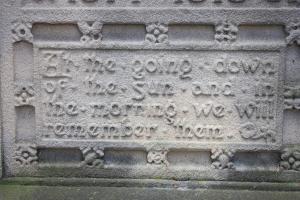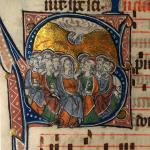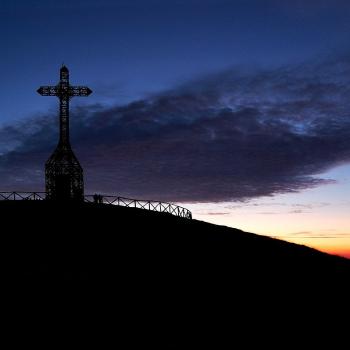
This post builds on the annual rhythm of Memorial Day to consider the import of cultivating a daily rhythm of remembrance in honor of those who have sacrificed so much for your life.
Memorial Day and the Annual Rhythm of American National Life
Memorial Day is part of my country’s liturgy. It is a key aspect of the annual rhythm of American national life. The intent is to remember and honor members of the US military who died while serving in the armed forces. Other nations and peoples spanning the globe set aside memorial days to remember those who died while serving and defending their countries and communities.
Memorial Pictures and Mementos as Reminders of Thankfulness
It is not simply memorial days where we remember those who have made an indelible impact on our lives. Many people position memorial pictures and mementos of deceased family members, friends, mentors, and inspirational figures in strategic places to remind them of their legacies. Those close to me are grateful when others remember their lost loved ones with words of affection and respect. Such keepsakes fill their hearts with thankfulness and guard against forgetfulness.
Remembrance of Those Who Are Alive
It is important that we also remember those who are alive and not forget them. They may be living in long-term care facilities, residing in prisons, being held hostage, or have gone missing. My adult son Christopher has been in a long-term care facility for three years now. We visit him daily and do whatever we can to assist in the journey in pursuit of meaningful recovery from his traumatic brain injury. I am very grateful to all those who reach out and tell us they are praying for Christopher and who remember him with affection. Occasionally, someone will join us to visit our son. That is also deeply touching. He is not forgotten.
The Fear of Being Forgotten and Abandoned
It saddens me how often I hear of residents who receive no visitors, even when their families live nearby. In my estimation, one of the scariest things in life is to be forgotten and abandoned. One of my friends who worked in a homeless shelter said what the homeless fear most is to die alone. It is also very scary to live alone.
I don’t want Christopher to be forgotten. In all honesty, one of the things I fear deep down inside is that someday my son might be forgotten. I write to remember him and to draw attention to his life, as well as his wife and young daughter in need. How I wish I had the time and energy to write on behalf of everyone who lives in seeming isolation so that others will not forget them. They are all such precious persons, as is each of you.
The Fear of Forgetting God’s Faithfulness
I also fear that I will fail to remember God’s faithfulness over the past three years. It is hard to imagine we have come this far on this journey with TBI. I am baffled that I have not died spiritually or have not gone missing in action. Others are surprised, too. The challenges in caring for my son and the family along with upheaval in other areas of life are constant. But God’s faithfulness is also constant. Here I call to mind one of my late mother’s favorite hymns, “Great Is Thy Faithfulness.” Sometimes I sing it to Christopher. My mother’s faith is not dead. Nor is she. She lives in the presence of the Lord, and her faith now realized in the presence of the Lord inspires me.
Just this weekend, someone asked me how I was able to keep going and not die spiritually. In response, I said I could not take credit for the stamina. While my wife and I are tenacious and resilient, we are also quite aware of the fact we are not alone. The Lord is with us, as are countless others. Other people remember Christopher and our family in prayer. They provide words of encouragement. They join us in hope and in advocating in various ways for Christopher’s life. The example of my mother and father’s resilient, steady faith also moves me forward. Their presence and witness help us keep going.
The Importance of Cultivating a Daily Rhythm of Remembrance
It is vitally important that I remember and give thanks for others’ remembrance of us. I am cultivating a daily rhythm of remembrance in my life.
It is important that each of us cultivates a daily rhythm of remembrance for those who have done so much for us. A rhythm of remembrance will include those who have sacrificed so much on our behalf. Here I remember those who have offered up sacrifices of prayer and finances and service to care for my son’s family. I remember my deceased parents whose lives of tenacious, undying, sacrificial love for me energizes me daily as I care for Christopher. Through it all, I remember the Lord, who encouraged his first followers to remember him and what he did for them. At the Last Supper, he initiated the Lord’s Supper, which was to be a regular rhythm of remembrance for the sacrifice of his life on their behalf: “Do this in remembrance of me.”
God told the Israelites to remember what he had done for them in bringing them out of Egypt and into the Promised Land. Passover celebrations, which the Lord’s Supper builds upon, are annual rhythms of remembrance. When we fail to remember, we lose hope and die.
How Easy It Is to Forget, How Important to Remember
It is easy to forget. Our attention spans are so short. It is not always easy to remember what others have done for us in a culture that champions “What have you done for me lately?” So, I am putting in place a daily rhythm of remembrance. This will include giving thanks to the Lord and for others during my devotions. I want this rhythm of remembrance to be second nature. That way, when I am down and depleted and tempted to despair, I will remember. Rather than being triggered to despair of hope, I desire to quickly turn to remember: the same Lord who has brought us this far on the journey with TBI will not abandon my family and me. God has not forgotten or forsaken us. Nor have others. Why should I lose hope now? The Lord is near.
How about you? What might you do to cultivate a daily rhythm of remembrance for those who have blessed you? Maybe you will put their pictures up in places so you can remind yourself of their undying love for you. Perhaps you will write about them and share those stories with others. Maybe you will devote time to pray and meditate on God’s mercies in your life.
It is very easy to forget, but so very important to remember. There is something incredibly life-giving about thankful people. Their daily rhythm of remembrance of others and spirit of thankfulness carries them forward with hope to face new challenges along the way.














